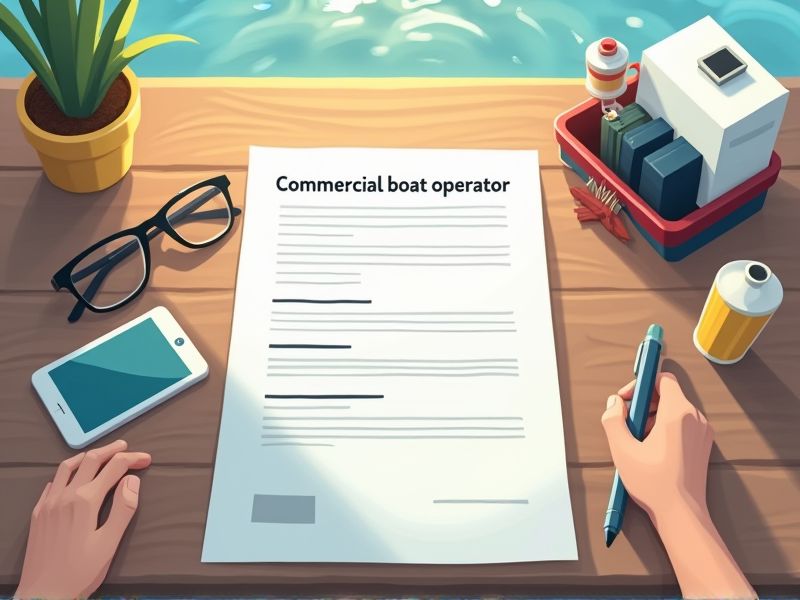
Operating a commercial boat involves navigating complex maritime environments and ensuring passenger safety, which drives the need for specialized certifications. These certifications verify an operator's proficiency in handling emergencies and maintaining compliance with maritime laws. Without proper certifications, operators risk penalties and accidents due to lack of sufficient training. Here are some important certifications essential for commercial boat operators.
USCG Merchant Mariner Credential (MMC)
The USCG Merchant Mariner Credential (MMC) is required for commercial boat operators as it certifies their expertise and ensures they meet safety standards. Compliance with this credential reduces the risk of maritime accidents and promotes a safer marine environment. The MMC validates that the operator has undergone rigorous training and possesses the necessary skills for navigating commercial waterways. Possession of the MMC enhances employment opportunities within the maritime industry by meeting legal and regulatory requirements.
Transportation Worker Identification Credential (TWIC)
TWIC is needed for commercial boat operators to ensure secure access to sensitive maritime areas. By verifying the identity and background of workers, it reduces the risk of unauthorized access to critical infrastructure. The credential helps comply with regulations aimed at safeguarding national security. It also facilitates smooth operations by streamlining the security screening process at maritime facilities.
STCW Basic Safety Training Certification
STCW Basic Safety Training Certification is a critical requirement for commercial boat operators because it ensures they have standardized safety skills recognized globally. This certification covers essential safety practices, including fire fighting, first aid, and personal survival techniques, which are crucial to managing maritime emergencies effectively. Compliance with STCW standards helps reduce the likelihood of incidents, promoting a safer environment for both crew and passengers. Regulatory bodies mandate this certification to align with international maritime safety protocols, securing operational legitimacy in the industry.
STCW Advanced Fire Fighting Certification
STCW Advanced Fire Fighting Certification equips commercial boat operators with the necessary skills to effectively manage and combat onboard fires, which are critical for ensuring crew and passenger safety. By understanding advanced fire fighting techniques, operators can minimize fire-related risks and potential damages to the vessel. Knowledge gained from this certification enables operators to lead emergency response teams and make informed decisions during crises. Regulatory requirements mandate this certification for compliance, ensuring that vessels meet international safety standards.
STCW Proficiency in Survival Craft and Rescue Boats (PSCRB) Certification
STCW Proficiency in Survival Craft and Rescue Boats (PSCRB) Certification equips commercial boat operators with essential skills to efficiently handle emergency situations at sea, ensuring crew and passenger safety during critical scenarios. The training covers practical knowledge on deploying and operating survival crafts and rescue boats, which is crucial when incidents like ship evacuation or rough weather arise. Possession of this certification significantly reduces the risk of casualties in maritime incidents, as operators are better prepared to manage rescue operations. Regulatory bodies mandate this certification to ensure uniform safety standards are met across commercial maritime operations.
First Aid and CPR Certification
The Coast Guard mandates first aid and CPR certification for commercial boat operators to ensure immediate response to medical emergencies at sea. These operators often navigate remote areas where professional medical assistance can't arrive quickly, making initial lifesaving actions critical. Certification in these skills can significantly improve survival rates during accidents or health crises aboard. Well-trained operators also instill confidence in passengers, potentially impacting commercial success through enhanced safety reputation.
VHF Radio Operator Certification
Commercial boat operators require VHF Radio Operator Certification due to regulations mandating proper communication systems for maritime safety. Having certified operators ensures that communication on distress channels is handled efficiently, reducing the likelihood of incidents at sea. VHF radios serve as critical tools for navigation and coordination with ports and other vessels. Certification validates that operators have the necessary skills to handle these tools, promoting safe and effective maritime operations.
Bridge Resource Management Certification
Bridge Resource Management (BRM) Certification enhances safety by equipping commercial boat operators with skills to effectively manage team communication and decision-making on the bridge. The certification ensures that operators can efficiently use available resources, including personnel and technology, to prevent navigational errors. Regulatory standards often mandate BRM Certification to align with international shipping practices and reduce maritime incidents. Obtaining the certification can lead to increased industry credibility and career advancement opportunities for operators.
Engine Room Resource Management Certification
Engine Room Resource Management Certification is essential for commercial boat operators because it ensures efficient utilization of resources in confined spaces, enhancing operational safety. The certification equips operators with skills to manage engine room personnel effectively, reducing the likelihood of human error. Knowledge gained from this certification promotes preventative maintenance practices, decreasing the risk of mechanical failures. As a regulated mandate, possessing this certification often aligns with industry standards and legal requirements, ensuring compliance and fostering trust with stakeholders.
Cargo Handling and Stowage Safety Certification
Cargo Handling and Stowage Safety Certification ensures that commercial boat operators adhere to established safety protocols, reducing the risk of accidents during operations. Properly trained operators help in maintaining balanced and secure cargo, which minimizes the likelihood of loss or damage to goods. Compliance with certification requirements can prevent costly legal liabilities and potential fines for ignoring safety standards. Certifying operators aids in building trust among clients and regulatory bodies, enhancing the operator's reputation in the maritime industry.
Summary
You, as a reader, can expect certified commercial boat operators to offer increased safety and compliance with maritime regulations. This certification typically leads to improved trust and reliability in their services. Their proficiency in navigation and emergency protocols often results in smoother and more efficient operations. Enhanced customer satisfaction and business credibility are common outcomes when operators hold recognized certifications.
